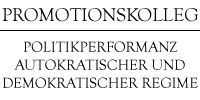Ance Kaleja
Ance Kaleja
Ance Kaleja received her Bachelor of Arts degree in History at the University of Latvia in 2009 and Master of Science degree in International Political Theory at the University of Edinburgh, UK in 2010. Her particular interest lies in the theoretical and practical dimensions of human rights. In December 2012, she initiated her Doctoral studies at the University of Heidelberg as a member of the Research Training Group “Policy Performance of Autocratic and Democratic Regimes” with a focus on how economic, social and cultural rights are perceived and executed across various political regime contexts. A more elaborate CV can be found here.
Dissertation
The doctoral dissertation project is concerned with Economic, Social and Cultural rights (ESCR) and socio-economic policies in different political regime contexts. Often left out of the discussion regarding social rights, cultural claims are an important component of the effective fulfillment of these rights as they set conditions through which local communities are provided access to these policies and can advance their claims following the principles of equality, inclusion and non-discrimination.
Although the ESCR have recently attracted more attention than ever before, the understanding of these, so called, second generation of human rights, is still obscured by myths, uncertainties and preconceptions as a relatively new field of study, and due to their international political and legal recognition having only taken place after the Second World War. ESCR, which include the rights to adequate food, income, education, housing, and health care, among others, are considered to be politically neutral rights, adaptable to different regime contexts. As of March 2013, the legally binding International Covenant of ESCR has been ratified by 160 states across the spectrum of regimes, requiring them to progressively fulfill ESCR.
It is generally agreed that democratic regimes perform better in securing human rights than autocracies. This can be said for civil and political rights with relative safety, but empirical comparative research of the last decade on the amount of social spending and economic and social issues suggests that democracies are not necessarily superior to autocracies in this respect. Although it does not contradict the existing theoretical considerations of the positive relation between the existence of a democratic regime and human rights performance, it does suggest that the relation between the two is more complex than previously presumed.
This project investigates through theoretical and empirical approaches and analyzes how ESCR are perceived and realized in different regime contexts. It aims to improve the understanding of ESCR by clarifying the complex interaction between ideology, power, institutions and socio-economic policies. As social processes take time to demonstrate effect, the research will also immerse in deeper analysis of case studies from a historical institutionalist perspective to uncover processes and their impact on political outcomes. Based on this understanding, the project will attempt to establish conditions, under which it can adequately be asserted that human rights are respected and realized.
Academic supervisor: Prof. Dr. Michael Haus


